Afghan refugee recovers from toll of war in the Upper Valley
| Published: 05-04-2023 1:27 PM |
WHITE RIVER JUNCTION — One of Abdullah Shah’s proudest moments since arriving the United States from Afghanistan was something hundreds of Vermonters celebrate every year — getting his driver’s license.
“It’s more than independence. I’m feeling very relieved,” Shah said in Pashto as interpreted by Faisal Azizi, a Dartmouth College student who is also from Afghanistan. The two have become good friends since meeting in the Upper Valley.
That moment provided Shah, 30, with the means to get to his housekeeping job at Lebanon’s Alice Peck Day Memorial Hospital from his room at the Hotel Coolidge in White River Junction, to run errands and attend language classes without assistance. It gave him the ability to help other Afghan refugees — and those from other countries — who have arrived in the Upper Valley the last couple of years. And it brought him one step closer to his ultimate goal of bringing his wife, three children, mother and widowed sister and her children — who are still at risk from the Taliban in Afghanistan — to the United States to join him.
“The life is so good here,” Shah said. “I find peace here.”
When Kabul fell in August 2021, photographs and videos shared around the world showed the difficulties Afghans faced trying to leave their country. Some of the most stark came from the Kabul airport, where crowds rushed to get on planes. People in the Upper Valley wanted to help. The question was how?
“It just became clear to me how much abundance we have in the Upper Valley, and really there should be an opportunity to share,” said Martha Tecca, executive director of CommunityCare of Lyme and co-founder of the Upper Valley Neighborhood Support Team, who has taken a lead role in assisting refugees in the area.
The group partnered with Ascentria Care Alliance, a refugee resettlement agency in Concord, and began making plans. They also reached out to other nonprofit organizations and community groups that were eager to help.
Traditionally, refugees are resettled through refugee resettlement programs in cities or high population areas, explained Alice Werbel, a volunteer with Supporting and Helping Asylees & Refugees, a Norwich- and Lyme-based nonprofit organization known as SHARe whose members are working with the CommunityCare of Lyme. But it became apparent that those traditional structures did not have the ability to help the thousands of people fleeing Afghanistan.
Article continues after...
Yesterday's Most Read Articles
 Zantop daughter: ‘I wish James' family the best and hope that they are able to heal’
Zantop daughter: ‘I wish James' family the best and hope that they are able to heal’
 Crowd turns out to honor late Ascutney Fire Chief Darrin Spaulding
Crowd turns out to honor late Ascutney Fire Chief Darrin Spaulding
 A Life: For Kevin Jones ‘everything was geared toward helping other people succeed’
A Life: For Kevin Jones ‘everything was geared toward helping other people succeed’
 Pick a sport and Pete DePalo’s has probably officiated it over the past 40-plus years
Pick a sport and Pete DePalo’s has probably officiated it over the past 40-plus years
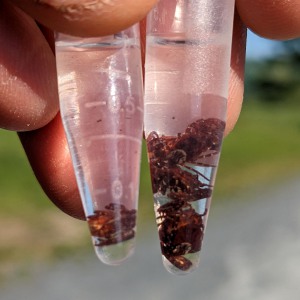 Out & About: Vermont Center for Ecostudies continues Backyard Tick Project
Out & About: Vermont Center for Ecostudies continues Backyard Tick Project
“There were so many small communities like our own that said, ‘We want to absorb, we want to welcome refugees,’ ” Werbel said. “Because the customary refugee resettlement communities were overwhelmed, the U.S. authorities said, ‘OK, even though that’s not where we usually send people, if you can demonstrate you’ve got the means to house, feed and look after these people until they are settled, then OK.’ ”
After leaving Afghanistan that August, Shah spent time in Doha, Qatar, and Hamburg, Germany, before landing in New Jersey for around three months. He then made his way to Lyme in January 2022, with five other former soldiers, where they initially settled at the inn Home on the Connecticut. Shah had joined the Afghan army when he was around 15, working his way up to become a member of the special forces.
“Sometimes you would be ... station(ed) at an outpost. Sometimes you’re going for offensive operations. Sometimes you were in the front lines,” Shah said. “Different things throughout the years, but in (a) nutshell, fighting; you’re supposed to fight.”
His final weeks in Afghanistan were chaos. Shah and his unit battled insurgents as they made their way to Kabul’s airport, where they were picked up by the U.S. military. Shah didn’t get a chance to say goodbye to his family.
After he arrived in Lyme, there were volunteers who donated homemade meals and winter clothing. Others gave Shah rides to medical appointments and language classes. They helped him with mountains of paperwork and drove in a car with him so he could get the state-mandated drivers education hours he needed to get his license.
“When I got here, I was completely blind,” Shah said. “I could see, but still I was blind because I could not speak the language.”
Shah almost immediately started taking English classes multiple times a week. After a couple months in Lyme, he moved to the Hotel Coolidge. He also started working at Alice Peck Day, where he spends six days a week cleaning patient rooms.
“It required some real partnership with employers to be helpful around the language issues and also to find the best fit for them,” Tecca said.
Volunteers stepped up to help Shah and others practice their English skills. Helene Rassias-Miles, director of The Rassias Center at Dartmouth College, helped start up a weekly informal language group where Shah and others can practice their English in a supportive setting. People who speak Pashto, Ukrainian, Russian, Spanish and Mandarin are among its attendees.
“What we really try to do is just keep them talking, talking, talking,” Rassias-Miles said.
As much as he is happy to be in the United States, Shah’s family is never far from his mind. He talks to them daily via WhatsApp and is still their sole financial provider.
“The biggest priority and the biggest stress I have is family and getting (…) my family here,” Shah said.
In order to do so, he has to become a permanent resident, a process that could take years and is full of roadblocks. Shah is working to save more money and better establish himself so that he can provide for his family once they arrive.
With his job at Alice Peck Day, Shah is mostly financially independent. After he got his license, a volunteer donated a car and CommunityCare of Lyme’s Welcome Fund covered Shah’s first insurance payment. The ability to be able to go move freely in the Upper Valley has been somewhat of a shock after spending around half his life in the military.
“These 15 years, I don’t count them as life, I don’t count them anything because those 15 years were … just fighting and everything,” Shah said. “The amount of independence people have here, the freedom, is surprising for me.” Men and women interact openly, something he didn’t always see in Afghanistan.
Sometimes, he doesn’t feel like he belongs. Shah is applying for permanent residency, but waiting for a green card can be a lengthy process. In the meantime he feels stateless, with the concept of home straddled somewhere between Afghanistan and the United States.
“We fought with the U.S. soldiers for the U.S. government … for the people of Afghanistan, as well as for the people of the U.S.,” Shah said. “We sacrificed, we got injured, we lost our friends and everything.”
He hopes that the United States and the world as a whole will not forget about them. In the Upper Valley, volunteers are making sure that is not the case. Shah has grown close with volunteers, particularly Tecca whom he thinks of as a family member.
“It’s very hard to find such a person like Martha, like, in other countries who understands you completely,” he said.
When Shah’s father died, it was Tecca who reached out to members of Dartmouth’s Muslim community, who organized a prayer service for him that afternoon. That community has also provided crucial support to Shah. Dartmouth is where he and other Muslims who live in the Upper Valley attend prayer and celebrations for Ramadan, among other Islamic holidays.
“We have a lot of chances to dine together,” Shah said.
While there have been myriad challenges in setting up a support network, there have also been many good moments.
“The best part of this story for me …” Tecca said, then paused. “There’s a million best parts of this story for me.”
She recalled attending a concert at the Orford Bandstand last summer with Shah and other Afghan refugees, where they all danced together as a group. And when Ukrainian refugees started to arrive, Shah was among the people who stepped up to volunteer, driving groups to language classes as volunteers had done for him the year before.
“Anytime, he’s like, ‘Martha whenever you call me, I am ready,’ I think, ‘That’s the most touching thing anyone has ever said to me,’ ” Tecca said.
Shah is optimistic for the future and excited for the opportunities ahead of him.
“My mind is now fresh,” he said. “I don’t think abou t war.”
Editor’s note: Visit cclyme.org/welcome-fund for more information. Valley News staff photographer Alex Driehaus can be reached at adriehaus@vnews.com. Staff writer Liz Sauchelli can be reached at esauchelli@vnews.com or 603-727-3221.

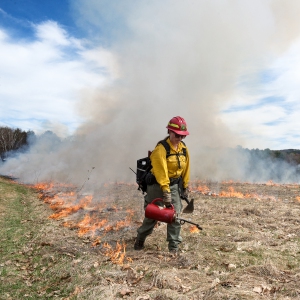 Preserving habitat in Etna
Preserving habitat in Etna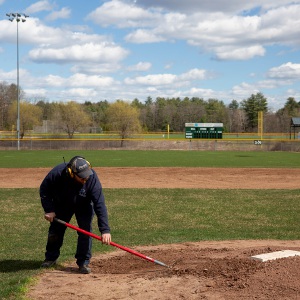 Pitching in
Pitching in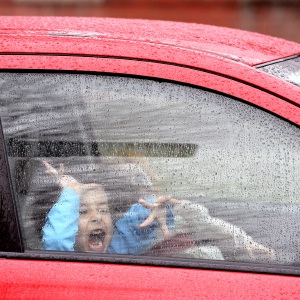 Picture day prep
Picture day prep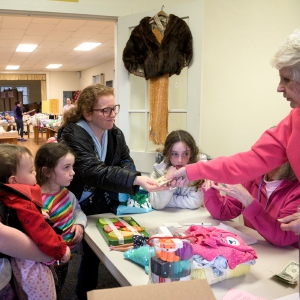 Helping a good cause in Etna
Helping a good cause in Etna
